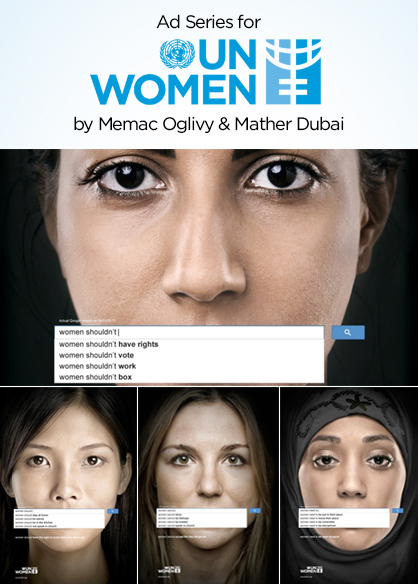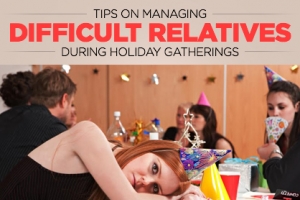UN Women Ad Campaign Shows Sexism Still Prevalent
A new ad campaign is startling and powerful in its simplicity. The UN Women ad series uses real-life Google search images to reveal how gender inequality remains a worldwide problem.
The ad series shows screenshots of actual Google searches, using the autocomplete feature, with the user having typed in a phrase such as “women shouldn’t” or “women cannot.” The autocomplete results are shocking, with “women shouldn’t” pulling up “women shouldn’t have rights,” “women shouldn’t vote,” and “women shouldn’t work.” Since Google searches provide a peek in to the collective consciousness of society, reflecting what the world asks the most, the autocomplete results show that the majority of people typing in “women shouldn’t” are using these negative sentiments. The ad campaign shows portraits of women with the search results covering their mouths, as if they're being silenced.
Different results come up in various countries, but globally the results were still negative. Typing in the same phrase with the word “men” substituted results in more positive autocomplete results such as “men shouldn’t shave” and “men shouldn’t cry.”
Across the globe, people have done their own searches, after seeing the ad series, and have posted the results on blogs and websites. A random search done on December 2 showed autocomplete results of “women shouldn’t drive,” “women shouldn’t vote” and “women shouldn’t have self esteem.”
The campaign has garnered worldwide attention, with the story earning “most shared item of the year” on AdWeek.com.
Nanette Braun, chief of communications and advocacy for UN Women, said, “UN Women is very heartened by the discussion the campaign has sparked. Very obviously there is a demand for a global conversation on women’s rights, empowerment and gender equality, which is exactly what the ads were intended to generate.
To find out more, LadyLUX talked to Christopher Hunt, creator of the ad campaign and head of art for Memac Ogilvy & Mather Dubai:
LadyLUX: Are you surprised at the global conversation on women’s rights, empowerment and gender equality that's been launched by the ad series?
Christopher Hunt: We have been pleasantly surprised by the viral success of this campaign. We wanted to start a conversation on the major barriers which are in place of women’s economic, political and social empowerment across the globe – issues that UN Women is working to address. We hope that our work will go some way to help raise awareness of the sexist global attitudes towards women, and will enable a dialogue to begin on the topic. We encourage people to join in the debate on twitter #womenshould or on UN Women website. We believe it has spread so quickly as the theme resonates with people across the world.
LL: Will there be any additional ads as part of this series?
CH: To complement the international viral success of the print campaign, here at Memac Ogilvy & Mather, Dubai, we have launched a video to help maintain the dialogue on gender equality: The Autocomplete Truth. By releasing this video, we hope to continue the conversation by branching out into more extensive debates.
LL: How did this project come about?
CH: This creative idea for UN Women began, as many searches naturally do, on a Google search bar. What we came across was simply shocking. The appalling global results to an auto-correct search of terms such as “women should” were something we felt needed to be shared. Ogilvy decided the best way to display the results would be on a woman: the target of the oppression. By placing the Google search bar across the woman’s mouth, we metaphorically highlighted how the words being used to describe women were silencing them on a social, political and economic level.
LL: What should people do who want to join the global conversation?
CH: We hope that this campaign will serve as a call to action for people everywhere. Join the conversation on twitter #womenshould and on Facebook. More details can be found on UN Women website.
LL: Did you selectively edit the results of the Google searches used in the campaign?
CH: What makes our campaign so powerful is its truth and simplicity. None of the searches were engineered to produce these results; that’s why we were so shocked to discover them. In order to raise awareness of the inequality women face, we did choose to highlight the most compelling answers, to deliver the most impact, however the search results from Google auto-correct were not falsified in any way. The actual searches were captured from Google sites around the world and are not specific to the Middle East, or the English language. However, as gender equality has been on centre stage in our region, we wanted to take a proactive initiative to demonstrate the willingness of people to act responsibly and effectively.
LL: Were you surprised at the search results?
CH: The Google search results left the agency speechless, so they definitely leave women’s empowerment equally as mute.
LL: Do you think your ad series will help change perceptions and improve global sexism?
CH: These adverts are a shocking reminder of how far we still have to go to achieve gender equality. There are still major barriers in place of women’s economic, political and social empowerment across the globe – issues that UN Women is working to address. We hope that our work will go some way to help raise awareness of the sexist global attitudes towards women, and will enable a dialogue to begin on the topic. By enabling a conversation to be started, we are happy to make an impact on at least just one person’s life and perception.
LL: Do most people think sexism, at least in some parts of the world, is a thing of the past? If so, do you think this ad campaign has opened their eyes?
CH: By enabling a conversation to be started on this important global issue, we are happy to make an impact on at least just one person’s life and perception. Like the UN Women, we have found the dialogue that the campaign is facilitating online to be very encouraging.
LL: What has most surprised you after the launch of this ad series?
CH: We have been most surprised by the amount of people who want to get involved with this debate. It has been so incredible to help raise awareness of the prevailing global sexist attitudes towards women. The fact that our campaign has been published across the globe and has recently been named “the most shared ad of the year” is an incredible step for the issues which the UN Women are working to address.
Tagged in: women, women, ad campaign, gender equality,




